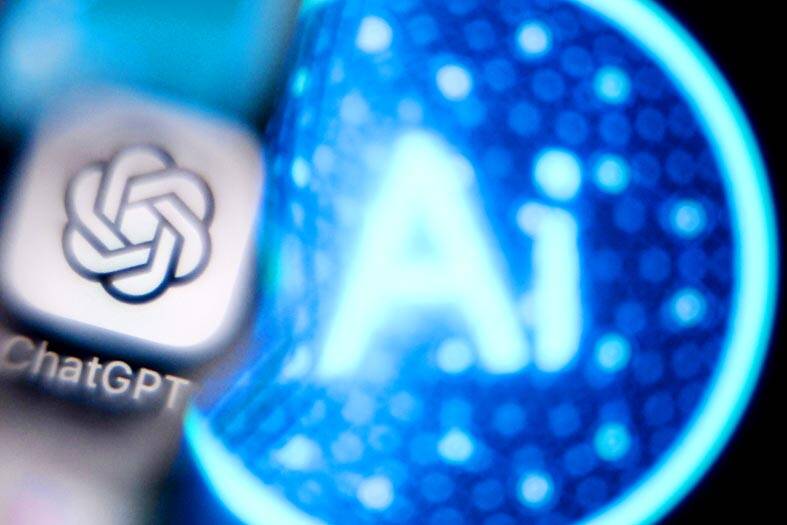OpenAI on Monday said it is making ChatGPT-powered Internet search available to all users, escalating its threat to Google’s dominance.
The San Francisco-based tech firm had beefed up its ChatGPT generative artificial intelligence (AI) chatbot with search engine capabilities in late October, but made the feature available only to paying subscribers.
The newly public feature enables users to receive “fast, timely answers” with links to relevant Web sources — information that previously required using a traditional search engine, the company said.

Photo: AFP
The upgrade to ChatGPT enables the AI chatbot to provide real-time information from across the Web.
“We’re bringing search to all logged-in free users of ChatGPT,” OpenAI chief product officer Kevin Weil said in a video posted on YouTube.
“That means it’ll be available globally on every platform where you use ChatGPT,” Weil said.
Examples of the new interface demonstrated by OpenAI resembled search results provided by Google and Google Maps, though without the clutter of advertising.
They also appeared similar to the interface of Perplexity, another AI-powered search engine that offers a more conversational version of Google by featuring the sources it referenced in the answer.
Rather than launching a separate product, OpenAI has integrated search directly into ChatGPT.
Users can enable the search feature by default or activate it manually via a Web search icon.
Since their launch, data on AI chatbots like ChatGPT or Anthropic’s Claude have been limited by time cutoffs, so the answers they provided were not up-to-date.
In contrast, Google and Microsoft Corp both combine AI-generated answers with Web results.
The addition of online search to ChatGPT could raise more questions about the start-up’s link to Microsoft, a major OpenAI investor, which is also trying to expand the reach of its Bing search engine against Google.
OpenAI chief executive Sam Altman has set his company on a path to becoming an Internet powerhouse.
He successfully catapulted the company to a staggering US$157 billion valuation in a recent round of fundraising that included Microsoft, Tokyo-based conglomerate Softbank Group Corp and AI chipmaker Nvidia Corp as investors.
Enticing new users with search engine capabilities would increase the company’s computing needs and costs, which are enormous.

With an approval rating of just two percent, Peruvian President Dina Boluarte might be the world’s most unpopular leader, according to pollsters. Protests greeted her rise to power 29 months ago, and have marked her entire term — joined by assorted scandals, investigations, controversies and a surge in gang violence. The 63-year-old is the target of a dozen probes, including for her alleged failure to declare gifts of luxury jewels and watches, a scandal inevitably dubbed “Rolexgate.” She is also under the microscope for a two-week undeclared absence for nose surgery — which she insists was medical, not cosmetic — and is

CAUTIOUS RECOVERY: While the manufacturing sector returned to growth amid the US-China trade truce, firms remain wary as uncertainty clouds the outlook, the CIER said The local manufacturing sector returned to expansion last month, as the official purchasing managers’ index (PMI) rose 2.1 points to 51.0, driven by a temporary easing in US-China trade tensions, the Chung-Hua Institution for Economic Research (CIER, 中華經濟研究院) said yesterday. The PMI gauges the health of the manufacturing industry, with readings above 50 indicating expansion and those below 50 signaling contraction. “Firms are not as pessimistic as they were in April, but they remain far from optimistic,” CIER president Lien Hsien-ming (連賢明) said at a news conference. The full impact of US tariff decisions is unlikely to become clear until later this month

GROWING CONCERN: Some senior Trump administration officials opposed the UAE expansion over fears that another TSMC project could jeopardize its US investment Taiwan Semiconductor Manufacturing Co (TSMC, 台積電) is evaluating building an advanced production facility in the United Arab Emirates (UAE) and has discussed the possibility with officials in US President Donald Trump’s administration, people familiar with the matter said, in a potentially major bet on the Middle East that would only come to fruition with Washington’s approval. The company has had multiple meetings in the past few months with US Special Envoy to the Middle East Steve Witkoff and officials from MGX, an influential investment vehicle overseen by the UAE president’s brother, the people said. The conversations are a continuation of talks that

CHIP DUTIES: TSMC said it voiced its concerns to Washington about tariffs, telling the US commerce department that it wants ‘fair treatment’ to protect its competitiveness Taiwan Semiconductor Manufacturing Co (TSMC, 台積電) yesterday reiterated robust business prospects for this year as strong artificial intelligence (AI) chip demand from Nvidia Corp and other customers would absorb the impacts of US tariffs. “The impact of tariffs would be indirect, as the custom tax is the importers’ responsibility, not the exporters,” TSMC chairman and chief executive officer C.C. Wei (魏哲家) said at the chipmaker’s annual shareholders’ meeting in Hsinchu City. TSMC’s business could be affected if people become reluctant to buy electronics due to inflated prices, Wei said. In addition, the chipmaker has voiced its concern to the US Department of Commerce